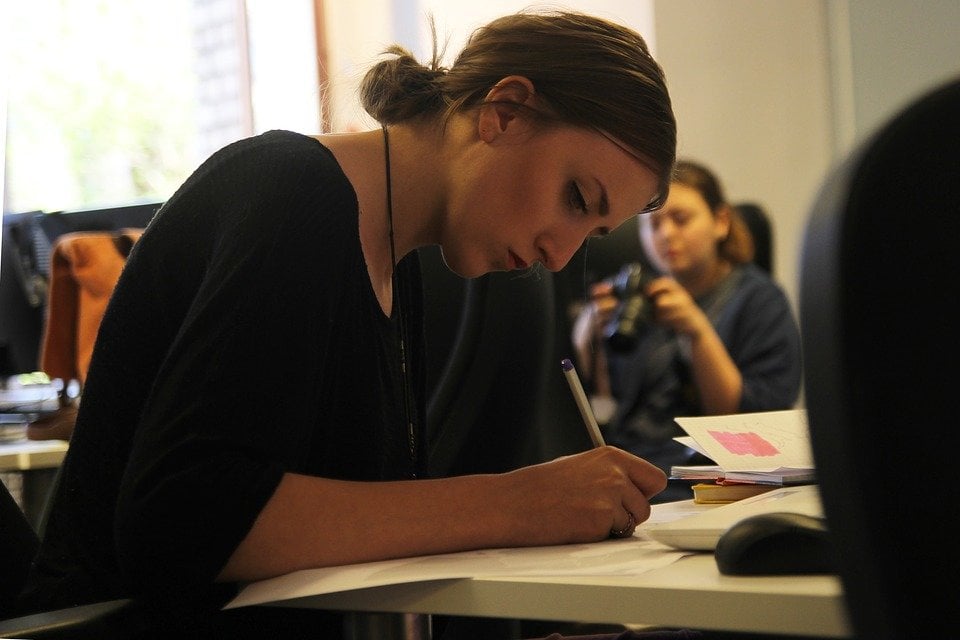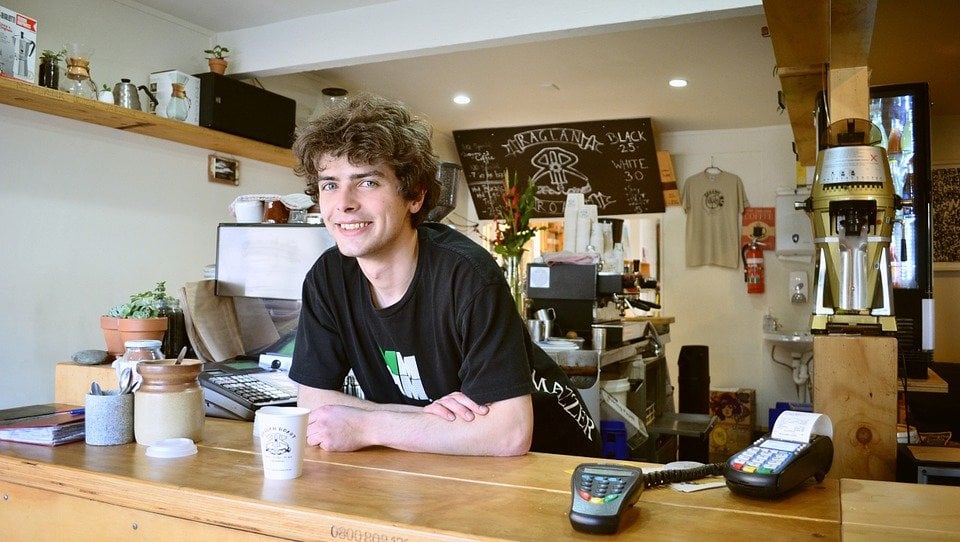Can You Work While Studying Abroad?
Working alongside your studies is a great way to learn about your host country while earning a bit of extra cash. Read on for our tips about how to build your resume in popular countries across the world.
TLDR 👀
- Working part-time while studying abroad is a unique opportunity for students interested in making some money and gaining valuable international experience.
- Depending on the country, you may or may not be able to work alongside your studies. Some countries require an additional visa.
- Popular student jobs include on-campus opportunities, bar or restaurant work, and teaching and tutoring.
- Make sure you can balance work and study -- after all, your main job is being a student. Don't miss out on a social life, either!

Can you work while studying abroad? The short answer is yes. One of my best friends studied abroad in South Africa and spent her days shuttling between classes at the University of Cape Town and her part-time job at the very prestigious Ogilvy South Africa, an experience she directly leveraged to work at a top advertising firm in Chicago after graduation.
Another classmate of mine would complete Russian to Chinese translations for a local export-import business during our semester in Xiamen, China, and I would teach an improv English class twice a week at a new school down the road. We both used those quirky experiences in future job interviews as illustrations of our appetite for entrepreneurship and cultural immersion and landed international jobs not long after graduation (coupled with other more substantial international work, of course, but it was a starting point).
Finding (or creating) a part-time job while studying abroad was an invaluable way of digging into the local culture and earning some much-needed money.
Perhaps not the job we were looking for, my friends and I were also offered to work at the nightclubs we frequented most, simply by drinking and mingling with the local party-goers. We passed on that one though because studying in China meant devoting hours and hours every evening to studying in the library.
Nonetheless, from both my personal experience and the experiences of others, finding (or creating) a part-time job while studying abroad was an invaluable way of digging into the local culture. Working while studying is a great way to earn some much-needed money, learn the language to a high degree of fluency, and coming away with stories we'd never have if we had just stayed in the library. Read on for tips on getting a job while studying abroad.
Which countries can I work in while studying abroad?

If you're convinced you'd also like to work while studying overseas, the next step is to figure out if the country you're going to allows you to work legally on a student visa. We've done our research to provide you a rundown of the logistics and legalities of working in some of the most popular countries for study abroad as American citizens.
Please note that Go Overseas is not the final word on immigration policies for each of these countries, so please check with the embassy of the country where you're planning to study abroad for the official policies on legally gaining compensated work experience on a student visa.
| Country | More information |
|---|---|
| UK | If studying longer than 6 months on a Tier 4 student visa, 20 hours per week during study periods, 40 hours during vacation periods. |
| France | Students may not work more than 20 hours a week (964 hours per year). A 20% contribution to social security is mandatory. |
| Spain | Students can work up to 30 hours per week in a job relevant to the field of study. The prospective employer must apply for a work permit on behalf of the student. |
| Germany | Students can work up to 120 days per year full-time or 240 days for part-time work. Language students aren't eligible. |
| Italy | Students can work up to 20 hours a week for one year (1,040 total). |
| Ireland | No additional visa is needed. If you study for at least one academic year, students may work up to 20 hours per week during the term and full-time during vacation. |
| China | Depending on the type of visa, it is possible to work with permission from your university and various bureaucratic documents. Many people continue to work unofficially in China, but getting caught carries serious repercussions and is not recommended despite the ease of doing so. |
| Singapore | For students attending an approved university and pursuing a full-time degree (not semester or year exchange), up to 16 hours per week of work are permitted. |
| Australia | No additional visa is needed. Up to 20 hours a week and full-time during vacation. |
| New Zealand | No additional visa is needed. On student visa, work is permitted up to 20 hours per week during the term, and 40 hours during vacation. |
| Costa Rica | Working while studying is not permitted in Costa Rica. |
Please note that any of the above information is subject to change at any time and prospective students should again contact directly with the embassy of the country where they plan on studying and verify their visa type and regulations about work directly with the authorities.
What kinds of jobs can I get while studying abroad?

The best kind of jobs for international students are ones that allow them to see a new side of the local culture beyond an academic and purely social perspective, hopefully by working in a local industry and mingling with different segments of the population besides university students (elderly, young children, industrial workforce, farmers, corporate professionals).
Work experience that allows students to use the local language are critical for actually developing fluency outside of the classroom if that's an important objective for them. And of course, the work should accommodate a student lifestyle with flexible working hours that don't disrupt course schedules, and a paycheck that off-sets some of the costs of living abroad.
The best kind of jobs for international students are ones that allow them to see a new side of the local culture beyond an academic and purely social perspective.
Whether you choose to work in a local restaurant or at a large corporation, your experience could open door to future opportunities, an interesting network in that country, and meaningful work experience relevant to your degree that can be proudly displayed on your resume after completion of the program.
Here are a few ideas for jobs you can pursue while still studying abroad:
On-campus jobs
This is a great option for meeting other students outside of the international exchange circles and to improve your language skills if you'd be working in the local language.
Check to see if your university has a center for work-study or simply ask local students about opportunities to find a job on campus. Unfortunately, many of these jobs may be administrative or not terribly exciting, so brace yourself for that.
Restaurants and bars
These are usually fun jobs that pay enough to offset some living costs and let you mingle with the locals. Working as a server or bartender can be a great way to practice the language, too.
Take a stroll through a popular area of town and stop in and chat to the manager to score a gig quickly. Make sure you bring your CV and evidence that your visa allows you to work in the country legally. Be careful when considering nightlife gigs, however, as the hours and nature of work can be draining and become a major distraction from your studies.
Teaching or tutoring English
If attending university in a country where English isn't the native language, there's generally a high demand for English teachers and tutors. You may find you're approached on-campus or in the street and asked to teach English. You can pursue formal or informal avenues for teaching, and a quick Google search or chat with your professors and other international classmates will yield many leads.
Tutoring and translation work
In China, a few classmates of mine printed their own posters advertising English-Chinese translations for a competitive hourly rate and created an email account to deal with all the requests (typically, you translate to your native language -- not from it).
All were very successful in picking up extra cash and gaining experience this way -- and even a few new friends who just wanted to meet up for lunch after seeing an advertisement by a foreigner.
The same applies to any skill you have. Can you teach music? Cooking? Dance? Leverage your inner entrepreneur and create a job for yourself. Again, check with the university to see what the legal parameters for doing so are.
Office jobs and internships
If you want a job that's more relevant to your degree, it's going to require major hustling and networking, which may be distracting from your primary focus as a student.
Decide what specific kind of work you want -- only by being focused on what skills you have and what you'd like to learn and in what kind of organization can others help you find something suitable.
Good places to start are the university career center, your professors, other students in your classes, local networking groups in your field, and websites like LinkedIn. Simply paying a visit to organizations you'd like to work for and pitching yourself yields the best results.
A unique and career-building opportunity
If you're able to score a gig that's relevant to your field of study, this is the best way to develop a more interesting resume and build a compelling story that will put you ahead of your peers who either stayed home from study abroad or went abroad and didn't bother to search for opportunities to gain skills outside of the classroom and interact more deeply with the local culture while they were there.
Even if you're working as a server in a local pub, the exposure you get to a wider variety of the local population than if you simply stayed on campus will prove both fun and meaningful in terms of cultural immersion and, no doubt, a few good stories. Not to mention the extra cash to pay for books, your dorm or apartment, and nights out with friends.
